American Family Insurance Data Science Institute adds an exciting chapter to a longtime private-campus partnership
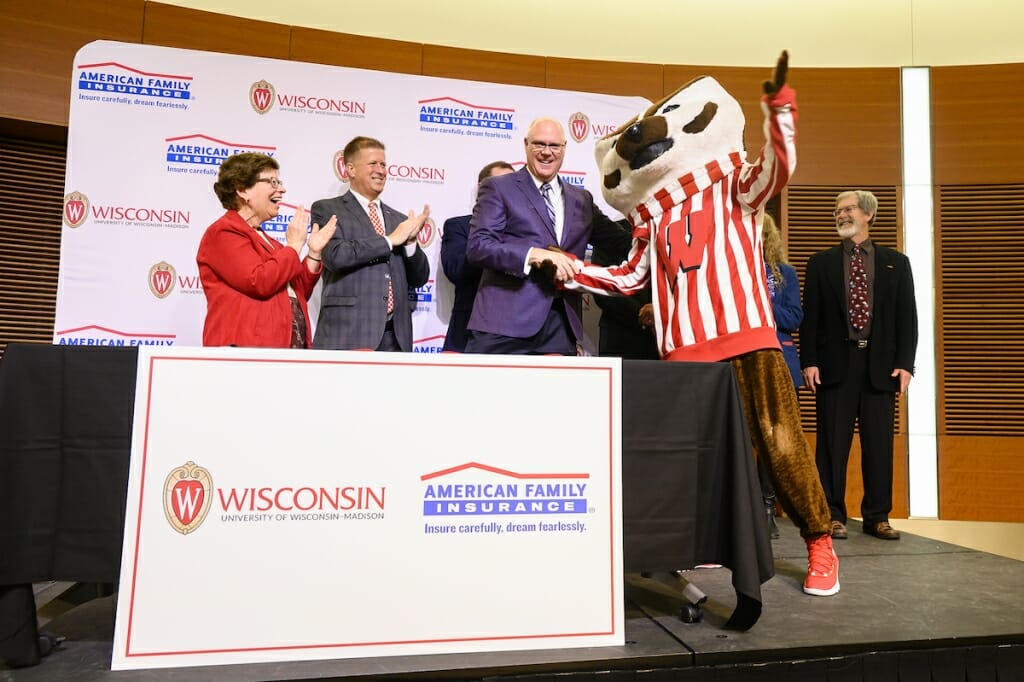
“We are happy to support the Bucky network,” said American Family Insurance Chairman and CEO Jack Salzwedel. “This is more money for new research — independent research … and a focus on ethical uses of data.” Photo: Bryce Richter
Not one to miss a big moment on campus, Bucky Badger joined members of the campus community and American Family Insurance on Friday at the Discovery Building for the launch of a new chapter in a long and successful partnership.
“The sun is shining today because we have a great set of announcements to make,” said Chancellor Rebecca Blank before signing a letter of intent with American Family Insurance CEO and chair Jack Salzwedel that outlines plans for a $20 million gift to fund UW–Madison data science initiatives, including $10 million in research over the next 10 years and establishing a $10 million endowment to create the American Family Insurance Data Science Institute on campus.
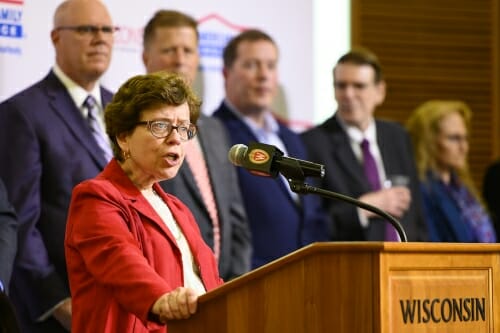
“Creating the American Family Insurance Data Science Institute will bring faculty together from across campus to collaborate on cutting-edge research, spark new opportunities for our students, and give us new ways to work with industry partners,” said Chancellor Rebecca Blank. Photo: Bryce Richter
The institute will be located in the McArdle Building across from the Discovery Building, and Brian Yandell, professor of biometry, statistics and horticulture, will be the interim director.
The institute, expected to open in July, joins 17 other university-wide research centers under the Office of the Vice Chancellor for Research and Graduate Education and will bring faculty together from across campus to collaborate on research, spark new opportunities for students, and be a model for new ways to work with industry partners.
Links date back almost a century
In his remarks, Salzwedel recapped the long history of partnership with the campus that started with Badger alum Herman Wittwer, who founded American Family Insurance (then known as Farmers Mutual Insurance Company) in 1927.
Since that time, American Family has strongly supported UW athletics, the Division of Recreational Sports, the American Family Children’s Hospital and programs to benefit scholarships.
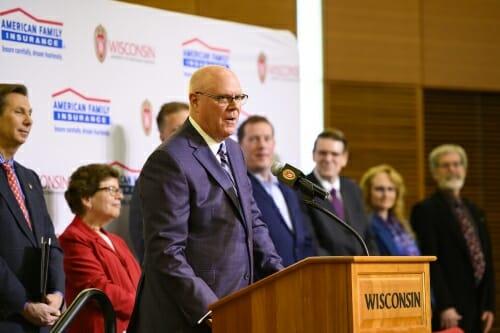
Jack Salzwedel, American Family Insurance chair and CEO, said, “This latest partnership recognizes the importance of using data science to help our customers, by providing insights on the challenges they face and how best to take action to meet them. The Institute will also develop a pipeline of potential future employees in the data science field, as well as provide valuable learning opportunities for our current employees.” Photo: Bryce Richter
American Family employees also support Badger students as mentors, provide career readiness training, and facilitate hands-on experience with internships and class projects. American Family is a leading supporter of Successworks, the career services program in the College of Letters & Science, and it has invested in the UniverCity Alliance program, which connects faculty and students from UW–Madison with communities in Wisconsin, helping them find practical solutions to some of their toughest challenges.
Salzwedel recognized Joan T. Schmit, the American Family Insurance Distinguished Chair of Risk Management in the Wisconsin School of Business at UW–Madison, who attended the event.
“We are happy to support the Bucky network,” Salzwedel said. “This is more money for new research — independent research … and a focus on ethical uses of data.”
An institutional priority
American Family’s support for research on campus has included projects in areas such as artificial intelligence and autonomous vehicles.
“Like other large companies, they have a very strong interest in the growing field of data science and statistics,” Blank said. “That interest has led us here today.”
Blank added that the announcement illustrates one of the reasons the UW has made it an institutional priority to build, grow and sustain these important relationships with our local business community.
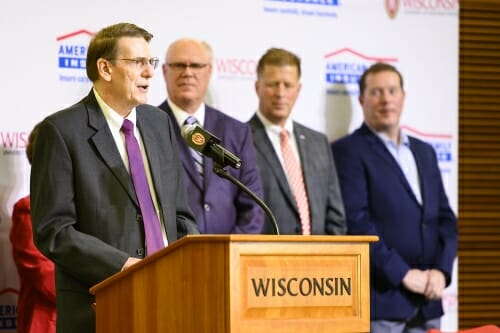
“Three primary functions will drive the mission of the institute: research, translation and collaboration,” said Norman Drinkwater, interim vice chancellor for research and graduate education. Photo: Bryce Richter
“In fact, the Office of Business Engagement was tasked with this very purpose when it was created,” she said. “And today’s announcement shows the value of building these partnerships.”
Friday’s announcement builds on the 2015 American Family and UW–Madison 10-year, $40 million affinity agreement, and the event included a partnership showcase featuring the wide breadth of initiatives and research advanced through that agreement, including UW Odyssey, IT Academy, the Center for Professional and Executive Development, Morgridge Center for Public Service, UniverCity Alliance and student outreach projects.
“Three primary functions will drive the mission of the institute: research, translation and collaboration,” said Norman Drinkwater, interim vice chancellor for research and graduate education.
Building on previous initiatives
Creating the multidisciplinary institute implements a major recommendation from a working group made up of faculty, alumni and business leaders with deep tech industry experience on how UW–Madison could best move forward to retain its leadership in computer and data sciences.
“A committee of faculty and staff from all parts of the campus was then formed to establish a framework for a new multidisciplinary center that would bring together faculty doing fundamental research in data science with those working on a broad spectrum of data-rich, difficult problems,” said Drinkwater. “This group crafted a proposal to establish a new data science institute that has now been unanimously approved by the two appropriate governance groups.”
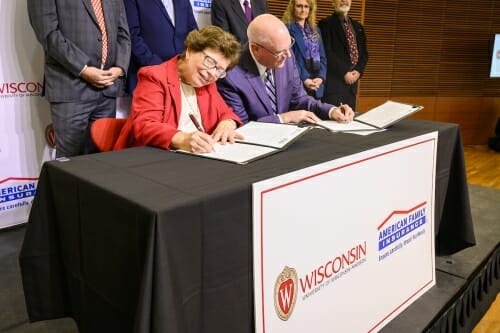
Chancellor Rebecca Blank and Jack Salzwedel, chairman and CEO of American Family Insurance, sign a letter of intent to significantly expand American Family’s support of the university by establishing a new American Family Insurance Data Science Institute. Photo: Bryce Richter
Establishing the data science institute builds on UW–Madison’s previous initiatives in data science, including formation of a Data Science Hub at WID, creation of a data science major that will likely attract close to 1,000 undergraduates over the next five years, and the work of the Institute for Foundations of Data Science, an interdisciplinary research effort supported by the National Science Foundation.
“Data science allows political scientists to develop better ways of predicting election outcomes and assessing the impact of changes in social or economic policy,” said Drinkwater. “It helps agricultural researchers advise farmers on ways to optimize their yields. It allows us to couple population data and census data with electrical power systems models and weather forecasting to predict electrical power grid markets. It helps cancer researchers develop better models for predicting which type of chemotherapy will work for an individual. And if there ever should be a new flavor of Babcock ice cream? Data science will help figure that out, too.”
